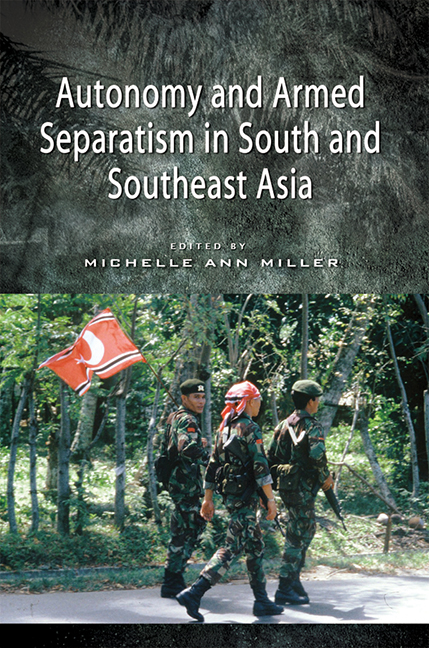Book contents
- Frontmatter
- Dedication
- Contents
- Acknowledgements
- About the Contributors
- 1 The Problem of Armed Separatism: Is Autonomy the Answer?
- 2 Mediated Constitutionality as a Solution to Separatism
- 3 Self-Governance as a Framework for Conflict Resolution in Aceh
- 4 Autonomy and Armed Separatism in Papua: Why the Cendrawasih Continues to Fear the Garuda
- 5 The Parallels and the Paradox of Timor-Leste and Western Sahara
- 6 Between Violence and Negotiation: Rethinking the Indonesian Occupation and the East Timorese Resistance
- 7 Struggle over Space in Myanmar: Expanding State Territoriality after the Kachin Ceasefire
- 8 Sri Lanka's Ethnic Conflict: The Autonomy-Separation Dialectic
- 9 Unitarianism, Separatism and Federalism: Competing Goals and Problems of Compromise in Sri Lanka
- 10 Autonomy and Armed Separatism in Jammu and Kashmir
- 11 Armed Conflicts and Movements for Autonomy in India's Northeast
- 12 Southern Thailand: The Trouble with Autonomy
- 13 The Last Holdout of an Integrated State: A Century of Resistance to State Penetration in Southern Thailand
- 14 Interlocking Autonomy: Manila and Muslim Mindanao
- 15 History, Demography and Factionalism: Obstacles to Conflict Resolution through Autonomy in the Southern Philippines
- 16 Conclusion
- Index
4 - Autonomy and Armed Separatism in Papua: Why the Cendrawasih Continues to Fear the Garuda
Published online by Cambridge University Press: 21 October 2015
- Frontmatter
- Dedication
- Contents
- Acknowledgements
- About the Contributors
- 1 The Problem of Armed Separatism: Is Autonomy the Answer?
- 2 Mediated Constitutionality as a Solution to Separatism
- 3 Self-Governance as a Framework for Conflict Resolution in Aceh
- 4 Autonomy and Armed Separatism in Papua: Why the Cendrawasih Continues to Fear the Garuda
- 5 The Parallels and the Paradox of Timor-Leste and Western Sahara
- 6 Between Violence and Negotiation: Rethinking the Indonesian Occupation and the East Timorese Resistance
- 7 Struggle over Space in Myanmar: Expanding State Territoriality after the Kachin Ceasefire
- 8 Sri Lanka's Ethnic Conflict: The Autonomy-Separation Dialectic
- 9 Unitarianism, Separatism and Federalism: Competing Goals and Problems of Compromise in Sri Lanka
- 10 Autonomy and Armed Separatism in Jammu and Kashmir
- 11 Armed Conflicts and Movements for Autonomy in India's Northeast
- 12 Southern Thailand: The Trouble with Autonomy
- 13 The Last Holdout of an Integrated State: A Century of Resistance to State Penetration in Southern Thailand
- 14 Interlocking Autonomy: Manila and Muslim Mindanao
- 15 History, Demography and Factionalism: Obstacles to Conflict Resolution through Autonomy in the Southern Philippines
- 16 Conclusion
- Index
Summary
Indonesian leaders are fond of referring to Papua's incorporation into their Republic as one of re-integration, colloquially known as kembali ke Ibu Pertiwi, or return to the Motherland. The term “reintegration” is designed to highlight that even though the territory was already “integrated” into Indonesia in the past, its hiving away by the Dutch colonialists from independent Indonesia from 1950 to 1962 qualifies the incorporation to be referred to as “reintegration”. This is premised on the fact that Papua, referred by Indonesians as Irian Barat (West Irian) since 1950 or Dutch New Guinea throughout the colonial period, was supposed to be part of independent Republic of the United States of Indonesia (RUSI)/ Negara Kesatuan Republic Indonesia (NKRI), the Unitary State of Indonesia, but due to Dutch manipulations and deceptions, supported by the West, this was denied. After continuing for another twelve years as a Dutch colony (January 1950 to August 1962), while the rest of Indonesia was independent, it was surrendered, by the Dutch, to the United Nations [United Nations Temporary Executive Authority, UNTEA], which in turn, transferred the territory to Indonesia in May 1963. Since then, Indonesia has ruled the territory with an iron fist, claiming many Papuan lives as well as causing damage to Indonesia's international reputation. The Papuan nationalists have been struggling for independent statehood since the early 1960s but despite the persistence of the aspiration, very little headway has been made. The various autonomy proposals made by Indonesia were partly aimed at defusing Papuan demands for independence as well as silencing the calls for separatism that have been ascendant since the fall of Soeharto in May 1998.
Papua was incorporated or reincorporated into Indonesia, first de facto and later de jure, largely due to the prominent role played by the Indonesian military. When Sukarno utilized diplomasi or diplomacy (as opposed to military combat) between 1950 and 1961, to regain the territory, he failed abysmally. However, where diplomacy failed, military brinkmanship has from the end of 1961, succeeded. Ever since, the Indonesian military has been a dominant player in Papua (as a symbol, consider that the TRIKORA Regional Command is located on a high ground overlooking the city of Jayapura, the provincial capital of Papua). Since May 1963, the Indonesian military's prominent role and the adoption of what has been described as the “security approach” have dominated Jakarta's policy towards the territory.
- Type
- Chapter
- Information
- Publisher: ISEAS–Yusof Ishak InstitutePrint publication year: 2012



